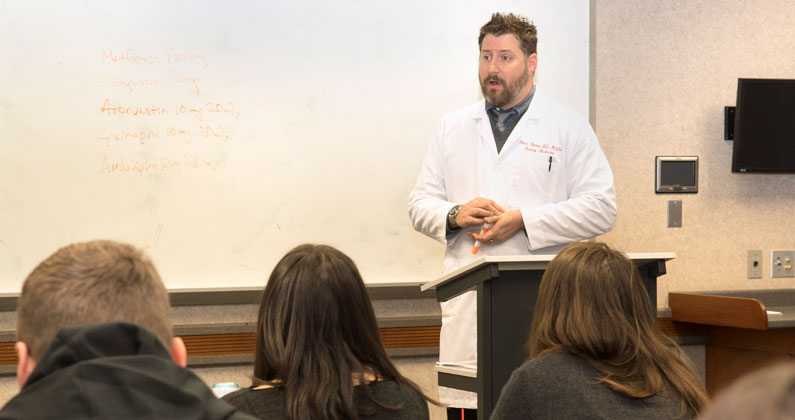'Coffee and Cases' Aims to Grow Clinical Skills
February 20, 2017
Dr. Peter Bidey conducts an early morning "Coffee and Cases" session. The informal,
monthly gatherings are designed to grow clinical skills and interest in primary care.
The sun is just beginning to rise in the sky as about 25 first- and second-year medical
students file into a classroom in Evans Hall.
Peter Bidey, DO ’08, assistant professor, family medicine, stands in front of them at a white board (not
unlike TV’s House) and begins to relay to the group the case of a patient who was recently treated
for diabetes-related complications through one of the College’s healthcare centers.
Dr. Bidey presents the facts of the case, tying in aspects from the second-year students’
lectures on the endocrine system, and the first-years’ lectures on biochemistry. The
students, sipping the coffee and eating donuts he has provided, then create a list
of questions they would ask the patient, and a diagnosis, which they then present
to Dr. Bidey.
These early-morning sessions, dubbed “Coffee and Cases,” occur once a month, and are
meant to be very informal. Led by Dr. Bidey and a resident from the PCOM/Suburban
Community Hospital Family Medicine residency, the sessions are hosted by the Student Association of the American College of Osteopathic Family Physicians (SAACOFP) but are open to all DO students.
Other programs hold similar morning reports, including CRIBS (Clinical Reasoning in
Basic Science), which introduces clinical problem-solving while second-year students
are still learning about basic science concepts, has long been a part of the PCOM
curriculum.
However, Morgan McCoy (DO ’19), president of SAACOFP, says that Coffee and Cases differs
in that it is a far less stringent environment and focuses its clinical concepts mainly
on primary care. The seminars grew out of a desire within SAACOFP to use its monthly
meetings as educational opportunities that first- and second-year students could benefit
from, she added.
“We came up with Coffee and Cases as a way to introduce clinical concepts to students
learning basic science. We do similar things in class, but this is a way to do it
in a smaller, non-intimidating group. It helps encourage more participation,” said
McCoy.
Dr. Bidey, who serves as faculty advisor to SAACOFP, said the focus on primary care
may help spark interest among students and increase their desire to enter that field.
A 2016 report by the Association of American Medical Colleges estimates a shortage
of up to 35,600 primary care physicians by 2025.
“Some students, early on, might not realize what the range is of primary care,” said
Dr. Bidey. “We're qualified to see people from birth to death, inside and outside
the hospital. You can care for one family over generations, and become part of their
family. Our term is ‘family medicine;’ ‘family’ is part of that.”
You May Also Like:
About Philadelphia College of Osteopathic Medicine
Established in 1899, Philadelphia College of Osteopathic Medicine (PCOM) has trained
thousands of highly competent, caring physicians, health practitioners and behavioral
scientists who practice a “whole person” approach to care—treating people, not just
symptoms. PCOM, a private, not-for-profit accredited institution of higher education,
operates three campuses (PCOM, PCOM Georgia and PCOM South Georgia) and offers doctoral degrees in clinical psychology, educational psychology, osteopathic
medicine, pharmacy, physical therapy, and school psychology. The college also offers
graduate degrees in applied behavior analysis, applied positive psychology, biomedical
sciences, forensic medicine, medical laboratory science, mental health counseling,
physician assistant studies, and school psychology. PCOM students learn the importance
of health promotion, research, education and service to the community. Through its
community-based Healthcare Centers, PCOM provides care to medically underserved populations.
For more information, visit pcom.edu or call 215-871-6100.
Contact Us
For general media inquiries, please contact the Office of Marketing and Communications
at 215-871-6300 or communications@pcom.edu. Visit our media relations page to view contact information for public relations personnel.
Connect with PCOM


